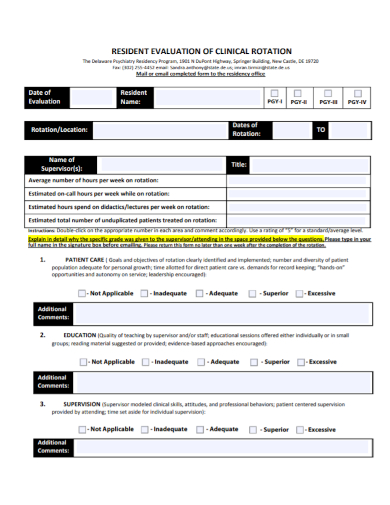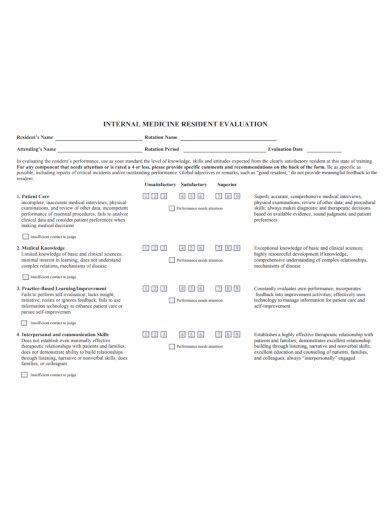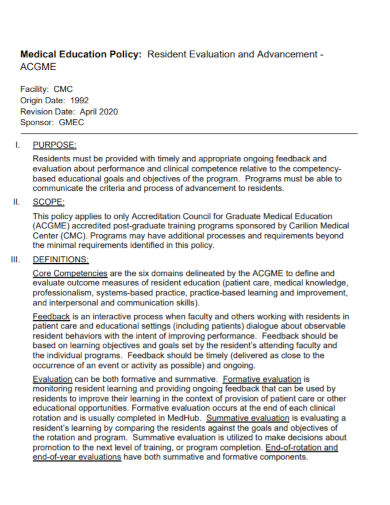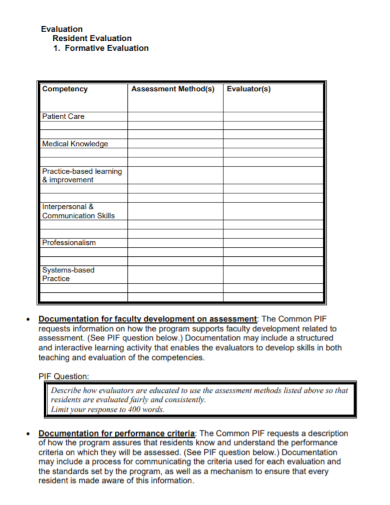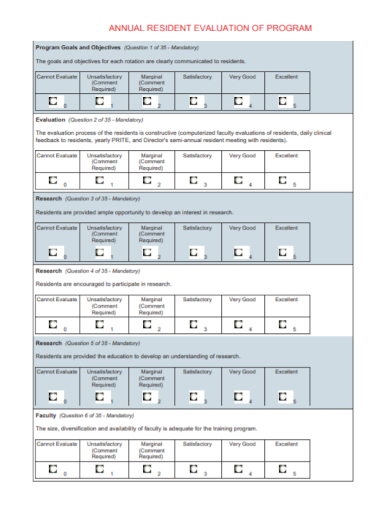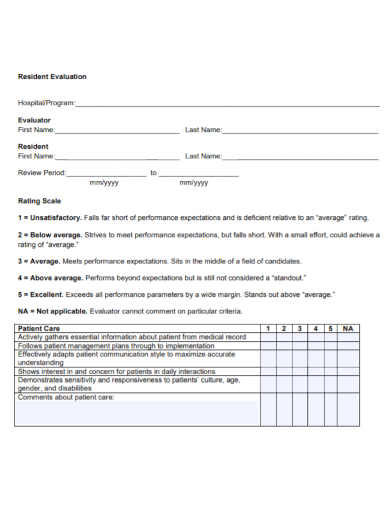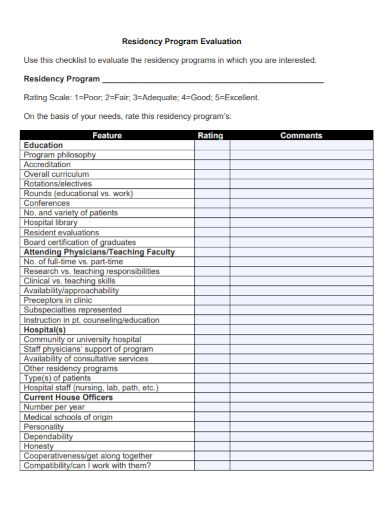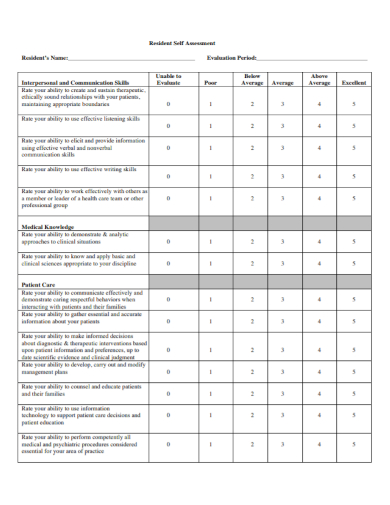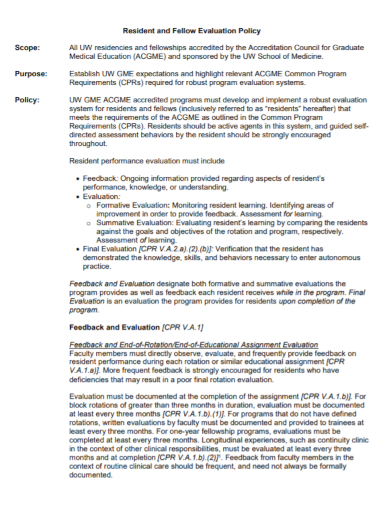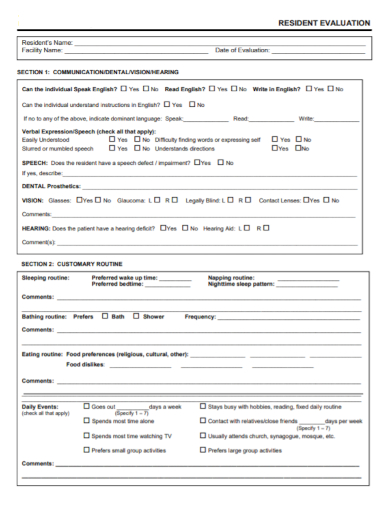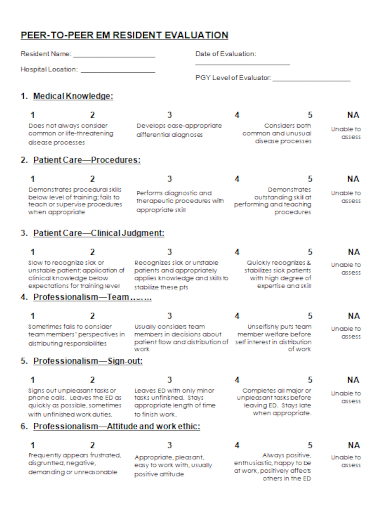10+ Resident Evaluation Samples
The recent covid-19 pandemic has had devastating effects in all sectors– especially in the healthcare industry. It just goes to show the critical role of doctors in this time, doctors are essential for an effective response to the COVID-19 outbreak. A doctor is a person with vast knowledge in the field of medicine who applies and dedicates his expertise to determining the patient’s medical problem and then using his skill to prevent or treat it. Health care workers are facing hazards and risks everyday to protect us. It is more important than ever to encourage students interested in studying medicine to boost the number of health care practitioners in our society. In this article, we provide free and ready-to-use samples of Resident Evaluations to use for doctors-in-training. Keep on reading to find out more!
1. Clinical Rotation Resident Evaluation
2. Internal Medicine Resident Evaluation
3. Medical Education Policy Resident Evaluation
4. Resident Formative Evaluation
5. Annual Program Resident Evaluation
6. Hospital Resident Evaluation
7. Resident Program Evaluation
8. Resident Self Assessment Evaluation
9. Resident Fellow Evaluation Policy
10. Resident Evaluation Form
11. Peer Resident Evaluation
What Is a Resident Evaluation?
Residents are doctors-in-training who have completed medical school and received an M.D. They are now pursuing training to become a certain doctor of a specific field, such as in pediatric or in surgery. Moreover, a Resident Evaluation is feedback that looks into and assesses the resident’s patient-care practices, as well as appraises and assimilates scientific knowledge and helps them improve their patient-care practices.
End-of-rotation evaluations, peer, staff, and patient assessments, mini-clinical evaluation exercises findings, internal medicine in-service training examination scores, and performance on objective exams may all be used by residency programs to assess milestone progress.
How to Make a Resident Evaluation
Studying medicine is a long and even tiring process. It takes years to become a doctor. In order to become a qualified physician, you need to learn through application and experience. This is why an residency evaluation is an important tool to assess the doctor-in-training’s progress. If you’re interested in making one of your own, here are some general criteria that comprises the assessment to guide in you:
1. For the treatment of health problems and the promotion of health, the resident must be able to deliver compassionate, appropriate, and effective patient care.
When working with patients and their families, they are required to communicate effectively and display caring and courteous behaviors. Additionally, depending on patient information and preferences, current scientific evidence, and professional judgment, make educated decisions about diagnostic and therapeutic approaches.
2. All medical and invasive procedures considered essential for the area of practice must be performed competently by the resident.
In this criterion, the resident must be able to successfully use information technology to support patient care decisions and patient education, establish and carry out patient management plans, and deliver health care services aimed at preventing or maintaining health.
3. In clinical contexts, the resident must display an investigative and analytic thinking style.
They must exhibit knowledge of known and evolving biological, clinical, and related (e.g. epidemiological and social-behavioral) disciplines, as well as the application of this knowledge to patient care, in order to meet this requirement.
4. Lastly, the resident must be using a systematic framework, analyze practice experience and undertake practice-based improvement actions.
Residents must be able to conduct research and evaluate their patient care practices, as well as analyze and integrate scientific data and improve their patient care practices. Additionally, they must discover, evaluate, and assimilate material from scientific research relevant to their patients’ health issues.
FAQ
What’s the difference between an attending physician and a resident?
A residency might last anywhere from two to seven years, depending on the speciality selected by the physician. Senior physicians oversee all of the residents. Attending physicians have finished their training and frequently assist medical students, interns, and residents in their education.
How long will it take you to finish your medical residency?
Depending on the speciality, residency might take anywhere from two to seven years of further school and training.
What role does medical school play in residency?
In the end, experts believe that being a good doctor is a personal choice. If anything, residency training is far more valuable than medical school education.
It is critical to provide safe and effective patient care. As a result, the purpose of a resident’s evaluation is to address competency, examine procedural training progress, and evaluate progress toward career goals. Ensure high-quality professionals in the health care sector by downloading our easily customizable and printable samples of Resident Evaluations today!
Related Posts
FREE 10+ Sample Rent Certificate Forms
FREE 8+ Sample Rental Reference Forms
FREE 8+ Nursing Assessment Samples
FREE 8+ Social Security Administration Forms
FREE 8+ Sample Annual Credit Report Forms
FREE 8+ Activity Director Job Description Samples
FREE 7+ Sample Psychosocial Assessment Forms
FREE 7+ Sample Business Risk Assessment
What Petition for Divorce / Dissolution?
FREE 54+ Questionnaire Samples
FREE 10+ Bankruptcy Intake Form Samples
FREE 8+ Rental Application Form Samples
FREE 8+ Sample Affidavit Forms
FREE 8+ Sample Physical Assessment Forms
FREE 7+ Sample Tax Forms

